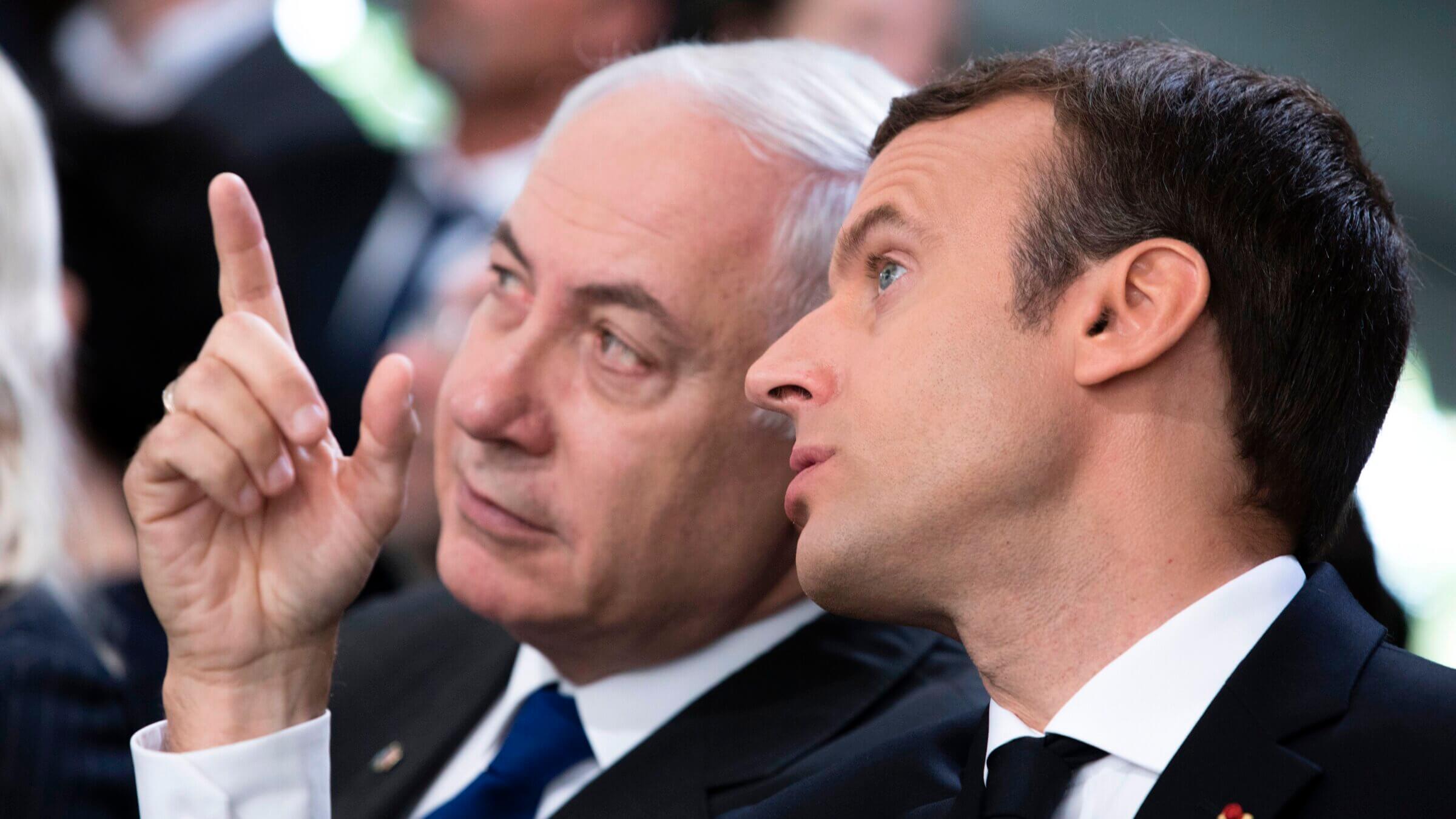Allies at odds, Netanyahu and Emmanuel Macron have more in common than they’d like to admit
Critics drawing unfavorable comparisons between the two leaders and their predecessors ignore key historical context

Benjamin Netanyahu and Emmanuel Macron. 2017. Photo by Getty Images
Last weekend, Emmanuel Macron and Benjamin Netanyahu butted heads over events in Gaza and Lebanon. It was not the first time, nor will it be the last time, the French president and Israeli prime minister have rumbled for reasons that have as much to do with personalities as policies. Nor was it the first or last time that pundits dusted off hoary clichés about Franco-Israeli relations as predictable as they were problematic.
A phone conversation on Sunday between the two men led to a sort of cease-fire — the only one Netanyahu seems willing to consider — but the diplomatic contretemps reminds us that Macron and Netanyahu are tragically alike. Both men express disdain for the democratic institutions of their countries; both men are despised by large majorities of their fellow citizens; and both men depend on extreme ethno-nationalist forces — the parties led by Itamar Ben-Gvir and Bezalel Smotrich in one instance, the party led by Marine Le Pen and Jordan Bardella in the other—to remain in power.
But this tussle also underscores the unhappy fact that critics of Macron’s latest remarks are happy to ignore inconvenient facts. Let’s review what took place over the weekend, then recall the larger historical context.
The spark to the latest firefight was Macron’s remark — made in a radio interview recorded early last week but broadcast on Saturday — that the bloodbath in the Middle East required a “return to a political solution, that we stop delivering weapons to fight in Gaza.” He added that the pursuit of a military victory in Gaza and Lebanon, which he described as the “new Gaza,” is a “mistake, including for the security of Israel.” Israel’s refusal to seek a political solution, he warned, would lead only to more “hatred.”
Almost immediately, Netanyahu fired back. “As Israel fights the forces of barbarism led by Iran, all civilized countries should be standing firmly by Israel’s side. Yet, President Macron and other Western leaders are now calling for arms embargoes against Israel. Shame on them.” Unwilling to allow Bibi the last word, Macron’s office responded that same day with a statement of its own, insisting that France’s friendship with Israel is “steadfast” and that the prime minister’s language was “excessive and detached from the friendship between France and Israel.”
Inevitably, many French-Jewish commentators instead found Macron’s language not just excessive, but downright egregious. In La Tribune juive, several French Jews hammered Macron. One subscriber, David Ohnona, declared that Macron “has the art of defending only dead Jews, like those of the Shoah,” and lamented that France “has once again taken the path of collaboration.” Another, Sacha Lamsika, affirmed that Macron quite simply “wants to disarm Israel.”
The council representing Jewish institutions in France, CRIF, did not disagree, declaring that Macron, rather than promoting peace, “was instead playing into the hands of Hamas and Hezbollah.”

These claims found an echo on this side of the Atlantic. Predictably, the New York Times columnist Bret Stephens stated that Macron was “really asking for an arms embargo: You can’t deny Israel weapons for potential use in one conflict while not also denying it those weapons for use in the others.”
With a wave of the hand, Stephens also dismissed Macron’s remark as “feckless virtue-signaling” and concluded that “whatever else one thinks about Israel, it remains an example of how a small country can make a big difference in world affairs, not least by confronting the threat Iran poses to the entire free world.”
It is unclear what Stephens means by “whatever else,” but let’s take it to mean the broader picture of present and past events. When it comes to the latter, Stephens thought it important to remind his readers that “on the eve of the Arab-Israeli War of 1967, President Charles de Gaulle imposed an arms embargo on the Middle East that mainly hit Israel.” Moreover, Stephens cannot help but repeat de Gaulle’s infamous remark that described the Jews as “an elite people, sure of itself and dominating.”
This account, however, skips past several “whatever elses.” First, though de Gaulle announced the arms embargo on Israel and seven Arab states in early June, he did not immediately act upon it. On June 7, as the historian Jean-Pierre Filiu notes, de Gaulle authorized the delivery of war materiel previously paid for by Israel, including crucial spare parts for Mirage fighters.
During the six-day offensive, Filiu states, this delivery was sufficient to replenish Israel’s stock of spare parts and armaments until the end of the conflict. In fact, Filiu concludes that “the embargo was so selective that, most probably, France delivered more weapons than the United States to Israel from June 1967 to January 1969.”
As for de Gaulle’s reference to Jews, it was and remains shocking. While his defenders observe that de Gaulle — the wartime leader who, as leader of the Free French, saw parallels between the liberation of France and creation of Israel — meant to praise the Jewish people, they ignore that de Gaulle should have known that others would take these words as antisemitic. While de Gaulle was not antisemitic, as the brilliant political theorist (and former Gaullist) Raymond Aron noted, his words would inevitably lend support to antisemites.
It is important to remember that the press conference did not take place during the Six Day War, but several months later, in late November. By then, it did not take a visionary to grasp that Israel’s territorial conquests, not to mention its unification of Jerusalem, were not temporary. Israel’s occupation of these territories, de Gaulle warned, “cannot but involve oppression, repression, expropriation, and a resistance that Israel, in turn, describes as terrorism.”
Six decades later, this power and prescience of this warning is also shocking — though not as shocking as the catastrophic loss of life in Gaza and the desperate plight of its inhabitants wrought by Israel’s effort to eliminate Hamas. When Stephens mocked Macron’s remarks as “feckless,” he was perhaps right. The words of the French president — who keeps trying, and failing, to channel de Gaulle’s visionary and imperious character — will not change events or minds.
But no less feckless are critics like Stephens who ignore the personal motivations of Netanyahu and ideological goals of his allies in pursuing a war without end that has had immeasurable human costs. In his biography of de Gaulle, Jean Lacouture recounts that whenever the writer and intellectual André Malraux, a staunch Gaullist who served as Minister of Culture, defended Israel, de Gaulle always replied, “But they go too far.” Tragically, this also applies not just to Israel’s actions in Gaza, but to those who blindly defend those actions.
A message from our Publisher & CEO Rachel Fishman Feddersen

I hope you appreciated this article. Before you go, I’d like to ask you to please support the Forward’s award-winning, nonprofit journalism so that we can be prepared for whatever news 2025 brings.
At a time when other newsrooms are closing or cutting back, the Forward has removed its paywall and invested additional resources to report on the ground from Israel and around the U.S. on the impact of the war, rising antisemitism and polarized discourse.
Readers like you make it all possible. Support our work by becoming a Forward Member and connect with our journalism and your community.
— Rachel Fishman Feddersen, Publisher and CEO





























